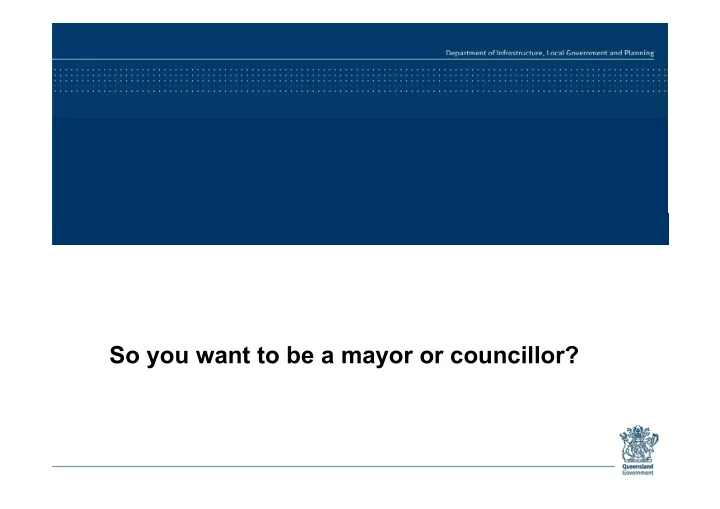

So you want to be a mayor or councillor?
What will you learn during this seminar? • During this seminar you will hear about— – Your opportunity to make a difference as a mayor or councillor – Role of the mayor and councillors – Eligibility to be a mayor or councillor – Campaigning for election as mayor or councillor Any references to legislation are not an interpretation of the law and are only used as a guide for participants. As the information in this seminar is general in nature and does not take into account individual circumstances or situations, participants should consider whether independent legal advice should be sought where appropriate.
What can you do for your community? As the mayor or councillor for your council you have the opportunity to build a better future for your community by doing the following— • Provide strategic direction for one of the biggest businesses in your community • Advocate your community’s aspirations and needs to other levels of Government • Deliver major infrastructure for the benefit of the community • Work to promote the safety and wellbeing of the community • Provide efficient and effective local services and facilities
How will the local government principles apply to you? Any action you take or any decision you make as a mayor or councillor must be consistent with the local government principles— • Transparent and effective processes and decision making in the public interest • Sustainable development and management of assets and infrastructure and delivery of services • Democratic representation, social inclusion and meaningful community engagement • Good governance of, and by, the council • Ethical and legal behaviours of councillors and council employees
What will you do as a mayor or councillor? As the mayor or councillor for your council you will— • take part in council meetings to make decisions for ‘the common good’, now and for the future, for the whole council area • provide leadership to the council and the community • shape the future of your community by adopting and implementing the planning scheme which sets out, for example, how land in the council area can be used and the standards the council will require developers to comply with • be responsible to the community for the performance of the council
What else would you do as mayor? As mayor, you will do everything that a councillor does and you will also— • Lead and manage council meetings • Represent the council and the community at ceremonial functions • Prepare and present the council’s annual budget • Lead and manage the chief executive officer to ensure council decisions are carried out
What obligations will you have? As a mayor or councillor you will be required to— • Publicly disclose your personal financial and non- financial interests • Ensure that you act in the public interest over any personal interests you may have • Ensure your conduct is lawful, ethical and generally appropriate for an elected representative • Not misuse information acquired as a mayor or councillor
What will you get paid? • Each year the Local Government Remuneration and Discipline Tribunal sets the maximum salary that can be paid to mayors, deputy mayors and councillors • Your council can resolve to accept less than the maximum amount set by the Tribunal • Your council will also decide what expenses it will reimburse for councillors and what facilities it will provide for councillors to do their job
Are you eligible to be a mayor or councillor? • In order to be a mayor or a councillor you must: – be an adult Australian citizen – reside in the council’s area – not be disqualified from being a mayor or councillor – be on the electoral roll • You are disqualified from being a mayor or councillor if you: – have been convicted of treason, electoral offences, bribery or certain offences under the Local Government Act 2009 – are a member of State or Federal Parliament – are a prisoner – are an undischarged bankrupt
What happens when you decide to run? • You can start your election campaign at any time • You must maintain a dedicated bank account and use it for all money received and spent on your campaign
How do you nominate? • The Electoral Commission will publish a notice calling for nominations • Your nomination will need to be received by 12 noon on the closing date for nominations • To apply you fill out the form available from the Electoral Commission and get endorsement from either— – a political party, or – six electors from your council area • You will be required to pay a nomination deposit of $250 • It is not possible to nominate as a candidate for both mayor and councillor
How do you run an election campaign? • Run your campaign with integrity and honesty • Ensure that any advertising you authorise complies with the requirements of the Local Government Electoral Act 2011 • Give your how-to-vote cards to the returning officer for approval before you start handing or sending them out • Check with your council to see if there are restrictions for election signs
How can you fund your election campaign? You are allowed to— • spend as much as you want to on your campaign • receive gifts, donations and/or loans to help finance your campaign All candidates must submit— • an election return to the Electoral Commission within 15 weeks after the election whether they were successfully elected or not All groups of candidates must also submit— • an election return to the Electoral Commission within 15 weeks after the election for the group
Where can you get more information? • Department of Infrastructure, Local Government and Planning www.dilgp.qld.gov.au • Electoral Commission of Queensland www.ecq.qld.gov.au • Like or follow us for the latest news! 2016 Qld Local Government Elections Information - DILGP
Recommend
More recommend